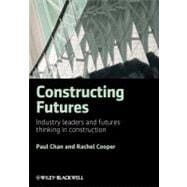
Note: Supplemental materials are not guaranteed with Rental or Used book purchases.
Purchase Benefits
What is included with this book?
| The Past. | |
| Introduction | |
| This chapter provides a background literature review on futures thinking | |
| It poses the question as to whether key thinkers are necessarily different from people at the grassroots | |
| The chapter also explains the methodology employed in this book | |
| This covers the conduct of the interviews and how the data collected was analysed and presented in the subsequent chapters.. | |
| Personal motivation and development of key thinkers | |
| This chapter presents a cross-sectional analysis of the nature of key thinkers and seeks to understand how they got involved with their current work | |
| The chapter is likely to distil the personal motivation and delve deep into their passion for a particular aspect of construction that each key thinker contributes in practice | |
| The Present: What do key thinkers think about contemporary issues. | |
| Partnering, alliances, collaboration and the whole gamut of initiatives | |
| The concept of partnering has been around for more than a decade in the construction industry | |
| Through the analysis of the views of key thinkers, the chapter should present a critical discussion of the trends towards collaborative working in relation to the performance and sustenance of the construction industry.. | |
| The role of the government | |
| Between 30% to 40% of construction work is through the public purse | |
| This chapter analyses the key thinkers' views on the role of government in terms of funding projects, as well as its role in regulating, legislation the working practices of the industry | |
| The chapter should also discuss the role of public-sector procurement and how this impacts on the future of the industry.. | |
| Sustainability | |
| Sustainability has become an important agenda in recent years, from the concerns with energy sources and efficiency, whole life costing, strategic view of procuring and using buildings, building sustainable communities etc | |
| The chapter should present an analysis of the key thinkers' views regarding sustainability and examines the notion of "cradle to grave" in greater depth.. | |
| Corporate social responsibility | |
| Corporate social responsibility appears to be the latest trend, or fad in the construction industry | |
| The chapter should present an analysis of the key thinkers' views regarding social responsibility and questions as to whether corporate social responsibility can be achieved.. | |
| Globalisation | |
| Anytime, anywhere and with anyone - globalisation invades every aspect of life | |
| The notion of "Think global act local" is inescapable from construction | |
| The chapter should analyse the key thinkers' views on the pervasiveness of globalisation and how this could alter the construction industry | |
| Another likely issue to be discussed could include cross-cultural management.. | |
| Relationship management | |
| The construction industry is somewhat incestuous | |
| Managing relationships forms the crux of the business | |
| The chapter is likely to analyse the key thinkers' views on the importance of networking, trust and building up long-term partnerships between stakeholders | |
| A glimpse of the future. | |
| Structure of the industry | |
| The chapter should discuss the changes to the structure of the industry in light of the key thinkers' views of the contemporary issues above | |
| Accordingly, the industry will become more polarised between the larger contractors (and networks of contractors) and the small jobbers who will become more distant from current industry-level initiatives | |
| The need to reconsider the notion of a single industry becomes even more pressing.. | |
| Education and training | |
| The education and training will change | |
| On the one hand, cross-cultural understanding and appreciation becomes an integral part of training the professional of the future | |
| Traditional craft boundaries also become questionable with the rising interests in modern methods of construction.. | |
| Professionalism in the industry | |
| The traditional boundaries between built environment professionals are shifting | |
| The re-emphasis of serving the public interest becomes core to the development of the professional | |
| This should impact on working practices, as well as the issues of social responsibility of the professional and the regulatory aspects of professions.. | |
| Evolving nature of construction work | |
| Construction work transcends the traditional project-based operations to see a further integration between design, construction and use | |
| Furthermore, the commercial aspects of construction become ever more vital and the nature of construction businesses will transform into one that places more emphasis on management | |
| On the other hand, traditional craft will diminish and labour will upskill in higher-order abstract skills e.g. process thinking with the growth in modern methods of construction.. | |
| Conclusions and Recommendations | |
| This chapter synthesises the issues discussed in the book and the trends identified by the key thinkers | |
| The chapter should also analyse the key thinkers' views as to how to embrace the future scenarios identified | |
| Table of Contents provided by Publisher. All Rights Reserved. |
The New copy of this book will include any supplemental materials advertised. Please check the title of the book to determine if it should include any access cards, study guides, lab manuals, CDs, etc.
The Used, Rental and eBook copies of this book are not guaranteed to include any supplemental materials. Typically, only the book itself is included. This is true even if the title states it includes any access cards, study guides, lab manuals, CDs, etc.